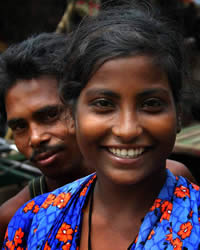Bengali Muslim in Bangladesh

Photo Source:
Steve Evans - Flickr
Creative Commons
|
Send Joshua Project a map of this people group.
|
| People Name: | Bengali Muslim |
| Country: | Bangladesh |
| 10/40 Window: | Yes |
| Population: | 135,533,000 |
| World Population: | 135,696,800 |
| Primary Language: | Bengali |
| Primary Religion: | Islam |
| Christian Adherents: | 0.18 % |
| Evangelicals: | 0.18 % |
| Scripture: | Complete Bible |
| Ministry Resources: | Yes |
| Jesus Film: | Yes |
| Audio Recordings: | Yes |
| People Cluster: | South Asia Muslim - other |
| Affinity Bloc: | South Asian Peoples |
| Progress Level: |
|
Introduction / History
The Bengali Muslims are the largest ethnic group in Bangladesh. Bangladesh gained independence from Pakistan in 1971. The spread of Islam in Bengal began in the 13th century through Sufi missionaries and traders and was solidified during the Mughal Empire. This blend of ancient Hindu traditions and Islamic influences is evident in their language, literature, music and art.
What Are Their Lives Like?
Life for Bengali Muslims varies significantly between urban and rural areas. Urban centers like Dhaka and Chittagong are bustling with economic activity and modern amenities, while rural areas are more focused on agriculture, with many engaged in farming rice, jute, tea and vegetables. Education is highly valued, but access to quality education remains a challenge, particularly in remote areas.
Muslim Bengali social structure is patriarchal, with men typically being the primary breadwinners and women managing the household. However, women's roles are evolving, with increasing participation in the workforce and higher education.
What Are Their Beliefs?
Most Bengali Muslims in Bangladesh follow Sunni Islam, specifically the Hanafi school of thought. Daily prayers, fasting during Ramadan, charity, and the pilgrimage to Mecca are central practices. Sufi traditions also play a significant role, with many visiting shrines and participating in festivals.
Islamic education is widespread, and religious festivals like Eid-ul-Fitr and Eid-ul-Adha are celebrated with great enthusiasm.
What Are Their Needs?
Bengali Muslims face challenges such as poverty, limited access to quality education and healthcare. Specifically vocational training and skill development programs can help equip them for the modern economy. Rural areas lack adequate healthcare infrastructure and sanitation facilities.
Prayer Points
Pray for peace and stability in Bangladesh, especially in regions prone to natural disasters and communal tensions.
Pray for the development of strong, godly leaders who can advocate for justice and peace.
Pray for a spiritual awakening among Bengali Muslims, that they may seek and encounter Jesus Christ.
Pray for the growth of the Christian church among the Muslim Bengalis, and for boldness, wisdom and love for local Christian believers.
Pray for sustainable economic development and provision for those in need.
Pray for improved access to quality education and healthcare services.
Pray for the empowerment of women and girls, and for cultural changes that respect and value their contributions.